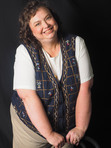Jamie Marchant's Blog, page 32
October 19, 2016
JD Byrne, Master of Fantasy
The author of the week is JD Bryne, who writes in the greatest of genres: fantasy.
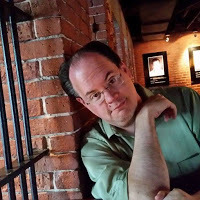 JD Byrne was born and raised around Charleston, West Virginia, before spending seven years in Morgantown getting degrees in history and law from West Virginia University. He's practiced law for more than 15 years, writing briefs where he has to stick to real facts and real law. In his fiction, he gets to make up the facts, take or leave the law, and let his imagination run wild. He lives outside Charleston with his wife and one-eyed dog.
JD Byrne was born and raised around Charleston, West Virginia, before spending seven years in Morgantown getting degrees in history and law from West Virginia University. He's practiced law for more than 15 years, writing briefs where he has to stick to real facts and real law. In his fiction, he gets to make up the facts, take or leave the law, and let his imagination run wild. He lives outside Charleston with his wife and one-eyed dog.
Interview1. What are your biggest literary influences? Favorite authors and why?
I’m always a little uncomfortable talking about influences because I’m one of those people who believes you’re influenced by everything you read (or hear or watch or . . .). So it’s hard to point to particular authors and call them influences without giving short shrift to a host of others who have influenced you (for good or for ill).
Favorites much easier to handle with the qualification that just because somebody is a favorite author of mine doesn’t mean I actually write like them (or even try). My old school favorites, ones I grew up reading, include Douglas Adams (love Hitchhiker’s Guide in all its forms), Kurt Vonnegut, and Ray Bradbury. More recently, I’ve fallen in love with work by Neil Gaiman (thanks to my wife), George R.R. Martin (ditto), Margaret Atwood, and John Scalzi.
2 What are you reading at the moment? Would you recommend it to readers of this blog? Why?
Right now I’m actually reading nonfiction - Imbeciles: The Supreme Court, American Eugenics, and the Sterilization of Carrie Buck. It’s about the Supreme Court’s decision in the 1920s affirming the ability of states to sterilize the “feeble minded.” It’s one of those cases where, from the distance of history, the Court got it terribly wrong. The book dives very deeply into the people involved with that case and the proceedings themselves. Fascinating and disheartening all at the same time. I’d certainly recommend to people interested in the area.
The last piece of fiction I read was The Rise of Endymion, the last of Dan Simmons’s Hyperion books. I wouldn’t recommend it - it’s overlong, undoes some of what’s come before in the series, and has a horribly annoying narrator. But if you’re a science fiction fan, and you’ve never read Hyperionor Fall of Hyperion (they’re really one long story), I highly recommend those. The first is a sci-fi take on the Canterbury Tales. It’s one of the best books I’ve ever read.
3. Do you think people have misconceptions about the speculative fiction? Why do you think it is a worthwhile genre?
I do think lots of people have misconceptions about what speculative fiction is (or where the boundaries of it are) and whether it’s a “worthy” genre. I think you see that in authors with literary reputations who dip their toes into fantasy or science fiction but insist that’s not really what they’re doing (I’ve written about that before here). As much as I enjoy her work, Atwood is a prime culprit in this, insisting that books involving future dystopias and genetic engineering aren’t sci-fi because they don’t have laser guns and space ships. I think the reluctance of authors like that to embrace the genre leads to a perception among some readers that it’s a backwater, good for cheap entertainment but not much else.
Not that there’s anything wrong with cheap entertainment! I’m perfectly happy to tell people a good, engaging story and walk away. Having said that, speculative fiction provides so many tools to allow writers to examine basic questions about what it means to be human (or not) that it can really go as deep and thoughtful as any other genre. It’s the ability to cast off the shackles of reality that, ironically, gives speculative fiction its ability to speak to our deepest humanity. All that makes it as worthwhile as any other genre.
4. Could you tell us a bit about your most recent book?
I’m currently in the process of finishing a fantasy trilogy. The first two books, The Water Road and The Endless Hills, were released earlier this year. The final one, The Bay of Sins, should be out by the end of the year.
It’s fundamentally about a secret that’s uncovered and what people choose to do with it. Do they make the truth known, even if it means ripping society apart? Do they try to rally an oppressed group to seek justice even if it might spiral into revenge? All that set in a world that isn’t our own (there are no humans, for instance), but also not like most fantasy settings (there’s no magic and armies fight with gunpowder, not swords).
I’ve been blogging about the trilogy all year on Water RoadWednesdays. You can find the list of those posts here.
5. Of all the characters you have created, which is your favorite and why?
I think my favorite characters are the ones I don’t really know much about going into the writing process and then reveal themselves as I work on a book. That pretty much eliminates main characters from this question, but I’m fond of them. Ben Potter from Moore Hollow has a lot of me in him (car guy, Marillion fan, eternal skeptic), so he has that going for him.
The best example I can think of for the situation where a character really grows into something unexpected is a woman named Mida Innis. Mida shows up for one scene in The Endless Hills, mostly as a way to show Antrey the horrors of war. When I was planning out The Bay of Sins, I decided to go back to Mida and see what she was up to following the events of The Endless Hills. I decided she had a story that needed to be told, which entailed coming up with a much better idea of the kind of person she was (and would become) than I ever had when I introduced her.
6. Do you have a day job in addition to being a writer? If so, what do you do during the day?
I do have a day job, one that thankfully allows me to write a lot, although it’s very different from writing novels - I’m an attorney. I’ve spent the last fourteen years in a Federal Public Defender office, where I do research and work on appeals. That means I write a lot of briefs and other legal pleadings. They’re not like writing fiction, obviously, but by the time I started writing fiction I had spent quite a bit of effort on becoming a better writer, on self editing and making sure I was connecting with readers.
Obviously, when you’re writing a brief or something similar you’re stuck with a set of fixed facts (often very ugly ones) and limited in what you can write by the applicable law. One of the reasons I enjoy writing fiction - fantasy and the like, especially - is that I can step outside those boundaries and let my imagination roam free.
7. Tell us a little about your plans for the future. Do you have any other books in the works?
I’ve got so many other books in the works I don’t know quite which direction I’ll be heading in next. The things I’ve published so far - Moore Hollow and The Water Road trilogy - were things that had been in the works for a long time. Once The Bay of Sins is finished I’ll be looking at a (relatively) blank slate for the first time in a while. It’s both exciting and terrifying at the same time.
One thought is to start a series that’s sort of John Grisham meets The X-Files, about an attorney who gets swept up into all kinds of paranormal activity. I actually started a book along those lines for NaNoWriMo years ago, and I like the idea of finishing it up and expanding on it. It may even dovetail into the world of Moore Hollow eventually.
The other idea is to dive into one of several stand alone novels with concepts I’ve flushed out a bit. One involves a thief trying to bring magic back to a world where is absence has created an environmental crisis. Another is a sci-fi story about woman who seeks asylum in a repressive place and is called to account for not speaking out against it. But then there’s the one about the poor schmuck who gets an alien tattoo on a strange world that drastically complicities his life . . . or the one that involves a humorous exploration of the afterlife.
Like I said, so many ideas, so little time!
Where can we find you online? (please cut and paste links):BlogWebsite FacebookTwitterAmazonGoodreadsLibraryThingThe Water Road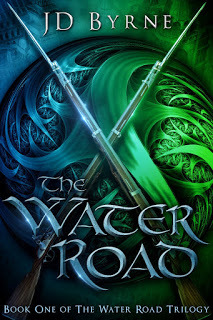
Two women are about to expose a terrible secret that will turn their world upside down.For centuries the great river known as the Water Road separated the Altrerians in the north from the
Antrey is a woman without a country, the daughter of a Neldathi mother and an Altrerian father. She’s found a role for herself in Tolenor, the headquarters of the Triumvirate, that's given her access to a secret the alliance has kept for generations. When she finds it, she explodes with rage and embarks on a quest to find justice for the Neldathi people.
Strefer is a reporter without a story, desperately working the streets of Tolenor for any kind of lead. When Antrey flees the city, Strefer slips in and discovers her uncovered secret, stained with blood and fury. It’s the story of a lifetime, one powerful forces want to keep her from telling. With the help of a renegade Sentinel, Strefer sets out for a mythical city in hopes she can make the world listen to the truth.
Together, they’ll inflame the passions of a people and set the world alight. The Water Road - first book of The Water Road trilogy.
Neldathi in the south. When the Neldathi clans united and struck out across the river, the nations of Altreria formed an alliance, the Triumvirate, to drive them back. For more than a hundred years after, the Triumvirate kept the Neldathi barbarians at bay, fighting amongst themselves across the Water Road.
Excerpt(in this scene, Antrey has discovered the secret that's going to change this world forever):
When she reached the end of that page, Antrey sat back in the chair, stunned. She read it again, to ensure that she knew precisely what it said. The Triumvirate, in order to protect itself, would set the Neldathi clans against each other, arranging a series of civil wars tied to fabricated, or exaggerated, religious disputes.
“That’s very clever,” she said to herself, recognizing that the strategy made a certain degree of sense when divorced from any concerns about right and wrong. “Keep your enemies fighting each other. That way, they can’t fight you. If any one side prevails it still benefits you, since whoever is left after the conflict will be weakened in the long run.” But she could not set aside the anger building inside her at the implementation of such a plan. She sat back in the chair and stared out the large window across from the desk. “By creating conflict where there is none, you sacrifice the lives of your enemies for your own comfort.”
Antrey knew too well of the wars between the clans. Although she knew that the stereotype of the brutal Neldathi barbarians that populated many of Alban’s books was not accurate, she could not avoid the fact that the clans fought each other regularly. The battles were fierce and, in some cases, lasted for days. Even the brief raids were terrifying. Antrey remembered seeing members of her clan carried away in such raids, taken for who knows what purpose. She remembered how the Speakers told of horrible things that one clan did to another, in the name of the gods, and how the other clan would respond in kind. Most of all, she remembered that the death and violence of those battles visited not just the warriors, but the old and young, the weak and the ill. That those she saw brutalized did not think of her as one of them did not mean she had not been heartbroken by their fate and furious at those who had caused it.
But it was only a proposal, right? Surely the Grand Council would not agree to such a ruthless policy being carried out in its name. Antrey leaned forward and turned the page to a brief summary of the debates about the proposal. They shocked her. The speeches were peppered with references to the Neldathi “barbarians,” “savages,” and “animals.” One Council member argued that “these brutes are going to fight anyone they can find, why not let them fight each other? If I hold a spear which may slip and pierce someone by accident, should I not point it at my enemy rather than my friend?” No one spoke up against the proposal. Not a single member of the Grand Council argued against it. No brave soul stood up and argued that, whatever threat the Neldathi might legitimately pose, they were sentient beings who should not be lied to and set upon one another like dogs.
By the time the votes were taken, there was no doubt about the outcome. There, in the neat script in the small red leather book, it was recorded that each of the nine members of the Grand Council voted in favor of the proposal. All agreed to purchase their own security with Neldathi blood, the blood of women, children, the aged, and anyone else. Antrey sat back in the chair and closed her eyes. Rather than weep, she sat and shook with fury, unable to get up. Clouds shifted outside and sunlight began to flow in from the balcony. It burned her face, but she did nothing to avoid it. She wanted to explode in a hundred different directions.
If you like what you've read, please comment and buy the book here:
 JD Byrne was born and raised around Charleston, West Virginia, before spending seven years in Morgantown getting degrees in history and law from West Virginia University. He's practiced law for more than 15 years, writing briefs where he has to stick to real facts and real law. In his fiction, he gets to make up the facts, take or leave the law, and let his imagination run wild. He lives outside Charleston with his wife and one-eyed dog.
JD Byrne was born and raised around Charleston, West Virginia, before spending seven years in Morgantown getting degrees in history and law from West Virginia University. He's practiced law for more than 15 years, writing briefs where he has to stick to real facts and real law. In his fiction, he gets to make up the facts, take or leave the law, and let his imagination run wild. He lives outside Charleston with his wife and one-eyed dog.Interview1. What are your biggest literary influences? Favorite authors and why?
I’m always a little uncomfortable talking about influences because I’m one of those people who believes you’re influenced by everything you read (or hear or watch or . . .). So it’s hard to point to particular authors and call them influences without giving short shrift to a host of others who have influenced you (for good or for ill).
Favorites much easier to handle with the qualification that just because somebody is a favorite author of mine doesn’t mean I actually write like them (or even try). My old school favorites, ones I grew up reading, include Douglas Adams (love Hitchhiker’s Guide in all its forms), Kurt Vonnegut, and Ray Bradbury. More recently, I’ve fallen in love with work by Neil Gaiman (thanks to my wife), George R.R. Martin (ditto), Margaret Atwood, and John Scalzi.
2 What are you reading at the moment? Would you recommend it to readers of this blog? Why?
Right now I’m actually reading nonfiction - Imbeciles: The Supreme Court, American Eugenics, and the Sterilization of Carrie Buck. It’s about the Supreme Court’s decision in the 1920s affirming the ability of states to sterilize the “feeble minded.” It’s one of those cases where, from the distance of history, the Court got it terribly wrong. The book dives very deeply into the people involved with that case and the proceedings themselves. Fascinating and disheartening all at the same time. I’d certainly recommend to people interested in the area.
The last piece of fiction I read was The Rise of Endymion, the last of Dan Simmons’s Hyperion books. I wouldn’t recommend it - it’s overlong, undoes some of what’s come before in the series, and has a horribly annoying narrator. But if you’re a science fiction fan, and you’ve never read Hyperionor Fall of Hyperion (they’re really one long story), I highly recommend those. The first is a sci-fi take on the Canterbury Tales. It’s one of the best books I’ve ever read.
3. Do you think people have misconceptions about the speculative fiction? Why do you think it is a worthwhile genre?
I do think lots of people have misconceptions about what speculative fiction is (or where the boundaries of it are) and whether it’s a “worthy” genre. I think you see that in authors with literary reputations who dip their toes into fantasy or science fiction but insist that’s not really what they’re doing (I’ve written about that before here). As much as I enjoy her work, Atwood is a prime culprit in this, insisting that books involving future dystopias and genetic engineering aren’t sci-fi because they don’t have laser guns and space ships. I think the reluctance of authors like that to embrace the genre leads to a perception among some readers that it’s a backwater, good for cheap entertainment but not much else.
Not that there’s anything wrong with cheap entertainment! I’m perfectly happy to tell people a good, engaging story and walk away. Having said that, speculative fiction provides so many tools to allow writers to examine basic questions about what it means to be human (or not) that it can really go as deep and thoughtful as any other genre. It’s the ability to cast off the shackles of reality that, ironically, gives speculative fiction its ability to speak to our deepest humanity. All that makes it as worthwhile as any other genre.
4. Could you tell us a bit about your most recent book?
I’m currently in the process of finishing a fantasy trilogy. The first two books, The Water Road and The Endless Hills, were released earlier this year. The final one, The Bay of Sins, should be out by the end of the year.
It’s fundamentally about a secret that’s uncovered and what people choose to do with it. Do they make the truth known, even if it means ripping society apart? Do they try to rally an oppressed group to seek justice even if it might spiral into revenge? All that set in a world that isn’t our own (there are no humans, for instance), but also not like most fantasy settings (there’s no magic and armies fight with gunpowder, not swords).
I’ve been blogging about the trilogy all year on Water RoadWednesdays. You can find the list of those posts here.
5. Of all the characters you have created, which is your favorite and why?
I think my favorite characters are the ones I don’t really know much about going into the writing process and then reveal themselves as I work on a book. That pretty much eliminates main characters from this question, but I’m fond of them. Ben Potter from Moore Hollow has a lot of me in him (car guy, Marillion fan, eternal skeptic), so he has that going for him.
The best example I can think of for the situation where a character really grows into something unexpected is a woman named Mida Innis. Mida shows up for one scene in The Endless Hills, mostly as a way to show Antrey the horrors of war. When I was planning out The Bay of Sins, I decided to go back to Mida and see what she was up to following the events of The Endless Hills. I decided she had a story that needed to be told, which entailed coming up with a much better idea of the kind of person she was (and would become) than I ever had when I introduced her.
6. Do you have a day job in addition to being a writer? If so, what do you do during the day?
I do have a day job, one that thankfully allows me to write a lot, although it’s very different from writing novels - I’m an attorney. I’ve spent the last fourteen years in a Federal Public Defender office, where I do research and work on appeals. That means I write a lot of briefs and other legal pleadings. They’re not like writing fiction, obviously, but by the time I started writing fiction I had spent quite a bit of effort on becoming a better writer, on self editing and making sure I was connecting with readers.
Obviously, when you’re writing a brief or something similar you’re stuck with a set of fixed facts (often very ugly ones) and limited in what you can write by the applicable law. One of the reasons I enjoy writing fiction - fantasy and the like, especially - is that I can step outside those boundaries and let my imagination roam free.
7. Tell us a little about your plans for the future. Do you have any other books in the works?
I’ve got so many other books in the works I don’t know quite which direction I’ll be heading in next. The things I’ve published so far - Moore Hollow and The Water Road trilogy - were things that had been in the works for a long time. Once The Bay of Sins is finished I’ll be looking at a (relatively) blank slate for the first time in a while. It’s both exciting and terrifying at the same time.
One thought is to start a series that’s sort of John Grisham meets The X-Files, about an attorney who gets swept up into all kinds of paranormal activity. I actually started a book along those lines for NaNoWriMo years ago, and I like the idea of finishing it up and expanding on it. It may even dovetail into the world of Moore Hollow eventually.
The other idea is to dive into one of several stand alone novels with concepts I’ve flushed out a bit. One involves a thief trying to bring magic back to a world where is absence has created an environmental crisis. Another is a sci-fi story about woman who seeks asylum in a repressive place and is called to account for not speaking out against it. But then there’s the one about the poor schmuck who gets an alien tattoo on a strange world that drastically complicities his life . . . or the one that involves a humorous exploration of the afterlife.
Like I said, so many ideas, so little time!
Where can we find you online? (please cut and paste links):BlogWebsite FacebookTwitterAmazonGoodreadsLibraryThingThe Water Road

Two women are about to expose a terrible secret that will turn their world upside down.For centuries the great river known as the Water Road separated the Altrerians in the north from the
Antrey is a woman without a country, the daughter of a Neldathi mother and an Altrerian father. She’s found a role for herself in Tolenor, the headquarters of the Triumvirate, that's given her access to a secret the alliance has kept for generations. When she finds it, she explodes with rage and embarks on a quest to find justice for the Neldathi people.
Strefer is a reporter without a story, desperately working the streets of Tolenor for any kind of lead. When Antrey flees the city, Strefer slips in and discovers her uncovered secret, stained with blood and fury. It’s the story of a lifetime, one powerful forces want to keep her from telling. With the help of a renegade Sentinel, Strefer sets out for a mythical city in hopes she can make the world listen to the truth.
Together, they’ll inflame the passions of a people and set the world alight. The Water Road - first book of The Water Road trilogy.
Neldathi in the south. When the Neldathi clans united and struck out across the river, the nations of Altreria formed an alliance, the Triumvirate, to drive them back. For more than a hundred years after, the Triumvirate kept the Neldathi barbarians at bay, fighting amongst themselves across the Water Road.
Excerpt(in this scene, Antrey has discovered the secret that's going to change this world forever):
When she reached the end of that page, Antrey sat back in the chair, stunned. She read it again, to ensure that she knew precisely what it said. The Triumvirate, in order to protect itself, would set the Neldathi clans against each other, arranging a series of civil wars tied to fabricated, or exaggerated, religious disputes.
“That’s very clever,” she said to herself, recognizing that the strategy made a certain degree of sense when divorced from any concerns about right and wrong. “Keep your enemies fighting each other. That way, they can’t fight you. If any one side prevails it still benefits you, since whoever is left after the conflict will be weakened in the long run.” But she could not set aside the anger building inside her at the implementation of such a plan. She sat back in the chair and stared out the large window across from the desk. “By creating conflict where there is none, you sacrifice the lives of your enemies for your own comfort.”
Antrey knew too well of the wars between the clans. Although she knew that the stereotype of the brutal Neldathi barbarians that populated many of Alban’s books was not accurate, she could not avoid the fact that the clans fought each other regularly. The battles were fierce and, in some cases, lasted for days. Even the brief raids were terrifying. Antrey remembered seeing members of her clan carried away in such raids, taken for who knows what purpose. She remembered how the Speakers told of horrible things that one clan did to another, in the name of the gods, and how the other clan would respond in kind. Most of all, she remembered that the death and violence of those battles visited not just the warriors, but the old and young, the weak and the ill. That those she saw brutalized did not think of her as one of them did not mean she had not been heartbroken by their fate and furious at those who had caused it.
But it was only a proposal, right? Surely the Grand Council would not agree to such a ruthless policy being carried out in its name. Antrey leaned forward and turned the page to a brief summary of the debates about the proposal. They shocked her. The speeches were peppered with references to the Neldathi “barbarians,” “savages,” and “animals.” One Council member argued that “these brutes are going to fight anyone they can find, why not let them fight each other? If I hold a spear which may slip and pierce someone by accident, should I not point it at my enemy rather than my friend?” No one spoke up against the proposal. Not a single member of the Grand Council argued against it. No brave soul stood up and argued that, whatever threat the Neldathi might legitimately pose, they were sentient beings who should not be lied to and set upon one another like dogs.
By the time the votes were taken, there was no doubt about the outcome. There, in the neat script in the small red leather book, it was recorded that each of the nine members of the Grand Council voted in favor of the proposal. All agreed to purchase their own security with Neldathi blood, the blood of women, children, the aged, and anyone else. Antrey sat back in the chair and closed her eyes. Rather than weep, she sat and shook with fury, unable to get up. Clouds shifted outside and sunlight began to flow in from the balcony. It burned her face, but she did nothing to avoid it. She wanted to explode in a hundred different directions.
If you like what you've read, please comment and buy the book here:
Published on October 19, 2016 03:00
October 18, 2016
Wonder Woman, my childhood hero
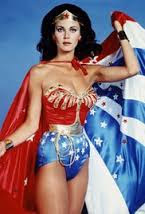
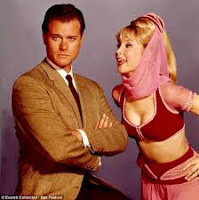
Two weeks ago I talked about Rey on Favorite Character Tuesday. Today I want to go back to my childhood hero who is in many ways Rey's precursor. I was born in 1967 and grew up in the 70s and 80s, so I wasn't exactly inundated with strong, powerful female role models on Television. On Scooby-Doo there were two female characters. The highly intelligent Velma was also a dork, unattractive, and completely useless without her glasses, which were always falling off. Then you had Daphne who was attractive but a completely brainless ditz. The truly interesting characters on the show were, of course, Shaggy and Scooby-Doo, both males. Other TV programs showed me a called the man "Master" and bowed to his every wish. Darrin on Bewitched makes his powerful wife promise never to do witchcraft and makes sure she washes the dishes by hand inside of with a twitch of her nose. She is almost always the dutiful housewife. I liked both Samantha and Jeannie, but even as a child, I was uncomfortable with them bowing to masculine control.
powerful 2000-year-old genie who
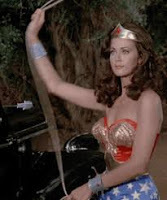 Then Linda Carter as Wonder Woman comes on to the scene in 1975. She may hide her identity in that of a secretary, but she's an Amazonian princess. In the Amazon, the women rule, and they never bow to male authority. Wonder Woman undoes her hair and twirls around, and she is a superhero with a magical golden lasso and bracelets which can deflect bullets. She fights with superhuman strength and ability and never needs to be rescued. As the theme song stated, "All the world is waiting for you, and the power you possess." She flies an invisible plane and defeats the bad guys. She is honored for her power by men, unlike Darrin whose threatened by his wife's strength. Wonder Woman taught me that women can be strong, and I absolutely loved her.
Then Linda Carter as Wonder Woman comes on to the scene in 1975. She may hide her identity in that of a secretary, but she's an Amazonian princess. In the Amazon, the women rule, and they never bow to male authority. Wonder Woman undoes her hair and twirls around, and she is a superhero with a magical golden lasso and bracelets which can deflect bullets. She fights with superhuman strength and ability and never needs to be rescued. As the theme song stated, "All the world is waiting for you, and the power you possess." She flies an invisible plane and defeats the bad guys. She is honored for her power by men, unlike Darrin whose threatened by his wife's strength. Wonder Woman taught me that women can be strong, and I absolutely loved her.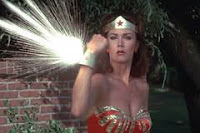 Yes, I know that she was sexually objectified by her skimpy outfit while Superman and Batman are always fully clothed, but that didn't occur to me as a child. Her butt kicking ability, however, did. She wasn't my only influence, but Wonder Woman helped nurtured my feminist consciousness before I even knew what a feminist was. (In my house, they were called "women libbers" and always referred to with disdain.) Heroes like her helped me to throw off the repressive patriarchal values of the culture I grew up in. I owe Wonder Woman a debt I try to repay through the creation of my own female characters.
Yes, I know that she was sexually objectified by her skimpy outfit while Superman and Batman are always fully clothed, but that didn't occur to me as a child. Her butt kicking ability, however, did. She wasn't my only influence, but Wonder Woman helped nurtured my feminist consciousness before I even knew what a feminist was. (In my house, they were called "women libbers" and always referred to with disdain.) Heroes like her helped me to throw off the repressive patriarchal values of the culture I grew up in. I owe Wonder Woman a debt I try to repay through the creation of my own female characters.Cheer her on!
In the comments, tell me about your childhood hero.
Published on October 18, 2016 03:00
October 17, 2016
The Magic of the Joined Kingdoms
Last week I discussed the geography of Korthlundia. Today I discuss its magic.The most important thing to remember about in my world is that it results from mixed blood, usually a mix of races, but occasionally a mix of classes will work. The more mixed the blood or the more unusual the mixture, the more powerful the magic. The requirement of mixed blood is the primary reason there is so little magic in the joined kingdoms any more. Korthlundia is a small, isolated country with a mostly homogeneous population. To make things worse, the church in Lundia, the southern half of the joined kingdoms, insists that the mixing of blood is an abomination to the goddess. The clergy refuse to believe that the great Sulis would bless such an outrage against all that is sacred with her holy gift. Sulis is the goddess of healing, and her clergy are supposed to be able to heal both body and soul, but because of the ignorance of the clergy, there are few Lundian priests with true healing magic. The Korthian church, the northern half of the joined kingdoms, has a more tolerant view of mixing blood, so they have a higher percentage of true healers among the clergy.There are three main classes of magic users. The first, as I have mentioned, are healers. Healers are able to go into a trance and join their consciousness with that of the patient. In this way they are able to feel the disease or injury and manipulate the tissue to promote healing, or they can as easily use their gift to harm. Healing is exhausting, but produces intense pleasure for the healer. Most healers exist outside the church and are looked down because of their mixed blood; they are seen as witches or demons and are not infrequently killed. One of the two main characters in The Kronicles of Korthlundia, Robrek, is one such healer. Slavers kidnapped Donella, Robrek’s mother, from her homeland, a far distant land whose people had never mixed with those of Korthlundia. Because of the unusual mixture of his blood, Robrek grows into the most powerful healer the joined kingdoms has seen for centuries. However, having such power is not without its drawbacks. Because of his power and dark coloring, he is often called “demon seed.” The local priest wanted him exposed at birth and tried to have him burned at the stake as a young man.The second class of magic users are the auroras. An aurora can see the multi-colored aura that surrounds all people and reveals their character, including their honesty. Since the magic of an aurora rests in the womb, they are always female. The onset of an aurora’s power happens when she first bleeds in the way of a woman. However, she cannot fully control her power until she has given birth to a child. Samantha, the crown princess of Korthlundia, is an aurora. One might think that such an ability would be invaluable in a monarch, but there is a problem. To be an aurora, a woman must have a mixture of common and noble blood. Since Samantha’s mother was indeed noble, the fact that Samantha is an aurora means that she is not the true daughter of the king. She is, in fact, a bastard. Her gift, therefore, becomes a liability that she must hide to preserve her position and even her life.
The final class of magic users are the Bards. Bards are able to affect the emotions of their audience with their music. There has not been a true Bard in Korthlundia in over a century, and little is known about them. That is why the Bard Alvabane is such a powerful enemy of our heroes. Since Robrek and Samantha do not understand bardic magic, they have great difficulty figuring out how to stop her.
The final class of magic users are the Bards. Bards are able to affect the emotions of their audience with their music. There has not been a true Bard in Korthlundia in over a century, and little is known about them. That is why the Bard Alvabane is such a powerful enemy of our heroes. Since Robrek and Samantha do not understand bardic magic, they have great difficulty figuring out how to stop her.
Published on October 17, 2016 03:00
October 15, 2016
The Goddess's Choice audio: Chapter 3
Today I present to you the Chapter 3 of The Goddess's Choice. When I get all the chapters done, I will release it as an audio book. In the meantime, I'd love to hear your comments on either the story itself or my narration of it.
If you like what you hear, you can buy the complete book on Amazon or other online stores.
If you like what you hear, you can buy the complete book on Amazon or other online stores.
Published on October 15, 2016 03:00
October 14, 2016
What does Solar want? Desire: the key to character
In character development, one of the most, if not the most important, aspect to think about is your character’s motivation. What does he or she want? It is a character’s desires that controls their actions, and if you don’t have a clear idea of what those desires are, you end up with an inconsistent character that acts in ways that don’t make sense. You need to know what your character desires in the abstract as well as what achieving that desire will mean practically in any specific situation.
King Solar in The Goddess’s Choice has ruled over 50 years of unbroken peace. What he wants is for that peace to outlive him, to be the legacy he leaves his people. This is his great desire, what he wants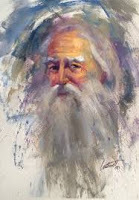 in the abstract. For that to happen practically speaking, he knows he must have an heir. Without one, rival claimants will tear the country apart. But he reaches 70 without having fathered an child despite having had two wives and numerous mistresses. The priest tell him that the only way for him to have an heir is to take a wife just entering puberty. He finds this distasteful, but since peace is so important to him, he takes a thirteen-year-old wife. If you don’t understand his motivation, this might seem a little creepy of him, but if you know what he wants, it makes perfect sense. Achieving his desire of peace means in this particular circumstance he must marry someone he views as a child. When his young wife Fenella also fails to get pregnant, he is forced to face that fact that he is indeed sterile and decides that if he can’t get his own heir, someone else will have to do it for him. He manipulates circumstances so that Fenella will have an affair. Thereby, he gets his heir.
in the abstract. For that to happen practically speaking, he knows he must have an heir. Without one, rival claimants will tear the country apart. But he reaches 70 without having fathered an child despite having had two wives and numerous mistresses. The priest tell him that the only way for him to have an heir is to take a wife just entering puberty. He finds this distasteful, but since peace is so important to him, he takes a thirteen-year-old wife. If you don’t understand his motivation, this might seem a little creepy of him, but if you know what he wants, it makes perfect sense. Achieving his desire of peace means in this particular circumstance he must marry someone he views as a child. When his young wife Fenella also fails to get pregnant, he is forced to face that fact that he is indeed sterile and decides that if he can’t get his own heir, someone else will have to do it for him. He manipulates circumstances so that Fenella will have an affair. Thereby, he gets his heir.
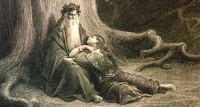 However, this complicates his life in ways that he hadn’t anticipated. Solar, like many characters, finds himself wanting more than one thing. Before Samantha’s birth, the nearly only focus of his desire was for lasting peace, but against his expectations, he falls in love with his daughter and finds himself wanting her to be happy.
However, this complicates his life in ways that he hadn’t anticipated. Solar, like many characters, finds himself wanting more than one thing. Before Samantha’s birth, the nearly only focus of his desire was for lasting peace, but against his expectations, he falls in love with his daughter and finds himself wanting her to be happy.
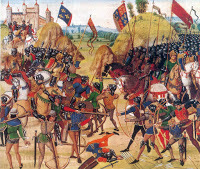 When those two desires come into conflict, he becomes indecisive. Samantha is so young that he knows she needs a strong husband to ensure the stability of her reign, but Samantha doesn’t want to marry, and he is convinced that she will hate him if he forces her into a marriage. Desire #1 one--continued peace--is now in conflict with desire #2--his daughter’s happiness. Which will win out? You’ll have to read The Goddess’s Choice to find out.
When those two desires come into conflict, he becomes indecisive. Samantha is so young that he knows she needs a strong husband to ensure the stability of her reign, but Samantha doesn’t want to marry, and he is convinced that she will hate him if he forces her into a marriage. Desire #1 one--continued peace--is now in conflict with desire #2--his daughter’s happiness. Which will win out? You’ll have to read The Goddess’s Choice to find out.
What do your character want? Discuss them in the comments.
King Solar in The Goddess’s Choice has ruled over 50 years of unbroken peace. What he wants is for that peace to outlive him, to be the legacy he leaves his people. This is his great desire, what he wants
 in the abstract. For that to happen practically speaking, he knows he must have an heir. Without one, rival claimants will tear the country apart. But he reaches 70 without having fathered an child despite having had two wives and numerous mistresses. The priest tell him that the only way for him to have an heir is to take a wife just entering puberty. He finds this distasteful, but since peace is so important to him, he takes a thirteen-year-old wife. If you don’t understand his motivation, this might seem a little creepy of him, but if you know what he wants, it makes perfect sense. Achieving his desire of peace means in this particular circumstance he must marry someone he views as a child. When his young wife Fenella also fails to get pregnant, he is forced to face that fact that he is indeed sterile and decides that if he can’t get his own heir, someone else will have to do it for him. He manipulates circumstances so that Fenella will have an affair. Thereby, he gets his heir.
in the abstract. For that to happen practically speaking, he knows he must have an heir. Without one, rival claimants will tear the country apart. But he reaches 70 without having fathered an child despite having had two wives and numerous mistresses. The priest tell him that the only way for him to have an heir is to take a wife just entering puberty. He finds this distasteful, but since peace is so important to him, he takes a thirteen-year-old wife. If you don’t understand his motivation, this might seem a little creepy of him, but if you know what he wants, it makes perfect sense. Achieving his desire of peace means in this particular circumstance he must marry someone he views as a child. When his young wife Fenella also fails to get pregnant, he is forced to face that fact that he is indeed sterile and decides that if he can’t get his own heir, someone else will have to do it for him. He manipulates circumstances so that Fenella will have an affair. Thereby, he gets his heir. However, this complicates his life in ways that he hadn’t anticipated. Solar, like many characters, finds himself wanting more than one thing. Before Samantha’s birth, the nearly only focus of his desire was for lasting peace, but against his expectations, he falls in love with his daughter and finds himself wanting her to be happy.
However, this complicates his life in ways that he hadn’t anticipated. Solar, like many characters, finds himself wanting more than one thing. Before Samantha’s birth, the nearly only focus of his desire was for lasting peace, but against his expectations, he falls in love with his daughter and finds himself wanting her to be happy. When those two desires come into conflict, he becomes indecisive. Samantha is so young that he knows she needs a strong husband to ensure the stability of her reign, but Samantha doesn’t want to marry, and he is convinced that she will hate him if he forces her into a marriage. Desire #1 one--continued peace--is now in conflict with desire #2--his daughter’s happiness. Which will win out? You’ll have to read The Goddess’s Choice to find out.
When those two desires come into conflict, he becomes indecisive. Samantha is so young that he knows she needs a strong husband to ensure the stability of her reign, but Samantha doesn’t want to marry, and he is convinced that she will hate him if he forces her into a marriage. Desire #1 one--continued peace--is now in conflict with desire #2--his daughter’s happiness. Which will win out? You’ll have to read The Goddess’s Choice to find out.What do your character want? Discuss them in the comments.
Published on October 14, 2016 03:00
October 13, 2016
Fantasy Food: Should we really make butter bear?
I was a bit disturbed when I read the following article from Forbes: Fantasy Foods. A food company is attempting to create food from fiction that fans want to eat. They serve this food at New York's comic con, but this is certainly sacrilege, isn't it? Jellybelly tried to make Bertie Botts Every Flavor
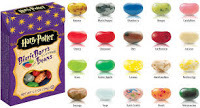 Beans, and that was flat out wrong. They couldn't make every flavor. They don't have magic. Yes, they made some unusual flavors, but really they were just Jellybellies with new packaging. While reading Harry Potter to my son (and yes, I read the first four books to him nine times), we both would salivate over butter bear. It sounds so smooth and tasty. My son and I both craved one, but no one without magic should try to make it. No real drink to leave up to the imagined deliciousness of butter beer. And Meadow cream from the Redwall books? One
Beans, and that was flat out wrong. They couldn't make every flavor. They don't have magic. Yes, they made some unusual flavors, but really they were just Jellybellies with new packaging. While reading Harry Potter to my son (and yes, I read the first four books to him nine times), we both would salivate over butter bear. It sounds so smooth and tasty. My son and I both craved one, but no one without magic should try to make it. No real drink to leave up to the imagined deliciousness of butter beer. And Meadow cream from the Redwall books? One
 shouldn't even try to make the mouth water flavor of this imaginary food. Reading the feasts in Redwall would set both of our stomachs rumbling, but any attempt to reproduce them in the real world, couldn't be anything other than disappointing.
shouldn't even try to make the mouth water flavor of this imaginary food. Reading the feasts in Redwall would set both of our stomachs rumbling, but any attempt to reproduce them in the real world, couldn't be anything other than disappointing.
What do you think? Should butter beer exist?
 Beans, and that was flat out wrong. They couldn't make every flavor. They don't have magic. Yes, they made some unusual flavors, but really they were just Jellybellies with new packaging. While reading Harry Potter to my son (and yes, I read the first four books to him nine times), we both would salivate over butter bear. It sounds so smooth and tasty. My son and I both craved one, but no one without magic should try to make it. No real drink to leave up to the imagined deliciousness of butter beer. And Meadow cream from the Redwall books? One
Beans, and that was flat out wrong. They couldn't make every flavor. They don't have magic. Yes, they made some unusual flavors, but really they were just Jellybellies with new packaging. While reading Harry Potter to my son (and yes, I read the first four books to him nine times), we both would salivate over butter bear. It sounds so smooth and tasty. My son and I both craved one, but no one without magic should try to make it. No real drink to leave up to the imagined deliciousness of butter beer. And Meadow cream from the Redwall books? One  shouldn't even try to make the mouth water flavor of this imaginary food. Reading the feasts in Redwall would set both of our stomachs rumbling, but any attempt to reproduce them in the real world, couldn't be anything other than disappointing.
shouldn't even try to make the mouth water flavor of this imaginary food. Reading the feasts in Redwall would set both of our stomachs rumbling, but any attempt to reproduce them in the real world, couldn't be anything other than disappointing.What do you think? Should butter beer exist?
Published on October 13, 2016 03:00
October 12, 2016
Fantasy Author, Alan Denham
My guest today writes fantasy in merry old England where all those fey creatures came from in the first place
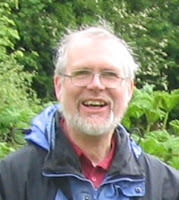 Alan Denham, born and raised in north London (the original one, in England). Grammar school, then University of Aston in Birmingham, combined degree in geology and chemistry (just!). Nine months in industry convinced me that I didn’t like it, so I went into teaching. In those days a science degree was qualification enough to become a secondary school teacher, which I did for a year and a half before deciding to get properly trained and go into junior schools. That worked well, but sadly I eventually ran into a pair of bullying bosses – a common enough story, but it still hurts! So I went back to University, took a Masters degree in computing and switched to adult education.In parallel with all that, I married but had no kids (we kept big dogs instead), and I acquired some woodworking skills, principally carving – and occasionally wrote in what little spare time I still had (e.g. when it was too cold to go into the workshop).
Alan Denham, born and raised in north London (the original one, in England). Grammar school, then University of Aston in Birmingham, combined degree in geology and chemistry (just!). Nine months in industry convinced me that I didn’t like it, so I went into teaching. In those days a science degree was qualification enough to become a secondary school teacher, which I did for a year and a half before deciding to get properly trained and go into junior schools. That worked well, but sadly I eventually ran into a pair of bullying bosses – a common enough story, but it still hurts! So I went back to University, took a Masters degree in computing and switched to adult education.In parallel with all that, I married but had no kids (we kept big dogs instead), and I acquired some woodworking skills, principally carving – and occasionally wrote in what little spare time I still had (e.g. when it was too cold to go into the workshop).
Now retired and living in north-east England, still writing, still carving, and generally keeping myself busy!Interview
1. Tell us a little about yourself?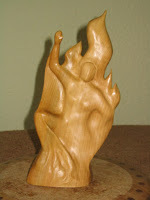 How much is ‘a little’? I am recently retired, having spent all but a year or so of my career in
How much is ‘a little’? I am recently retired, having spent all but a year or so of my career in
education of one form or another – mostly teaching children around ages 9-13, but my full range of experience is much wider – infants to adults in a wide range of backgrounds, abilities, and educational levels. Working mostly with ‘Middle Years’ children, I tended to be more a generalist than a specialist, but my official specialism started off as ‘general science’ and later moved into computers. Now I am retired I get involved with a lot of things, but my two main hobbies are woodcarving (http://www.coquetdale.org.uk/artists.php?id=117) and writing.
2. What made you want to become a writer?A challenge from a friend. I have told this one often, but it bears telling again. So far, I have written mostly as half of a team. Many years ago my old friend Graham decided to try his hand at writing and produced a lengthy tome that wasn’t publishable material, but showed promise. He wouldn’t let me work on it for him, so I tried my hand on my own. It was harder than I thought, and the results were awful! I showed it to Graham, mostly as grudging acknowledgement that he was rather better at this game than I was – but he grabbed it with both hands, went off and hid for a month, then sent it back – doubled in length, with a few extra characters, and showing a LOT of promise!
It went on from there, mostly as a sort of private joke between friends. Over several years we found we could work together pretty well; I plan the outlines and the big scenes; he fills in some characterisation and overdoes the world-building. Then we argue, but the final outcome is usually better than either of us could have done on our own.
After doing that for nearly 25 years, we reckoned we had come up with something publishable, just about the same time that electronic self-publishing became viable – so we did.
3. Do you think people have misconceptions about the speculative fiction? Why do you think it is a worthwhile genre?I have been a reader of SF and some Fantasy since I first became aware of the genre – before I could even spell ‘genre’! These areas thrive on simple storytelling. OK, all books need to have a good story, but what do you add? Crime and adventure (and war, and westerns) add excitement and action – sometimes so much that the actual story gets so deeply buried it ceases to be important. That is generally not to my taste! More literary work adds intense studies of the human condition – and becomes very erudite, and (for me) sometimes requires considerable effort to read. Again, not to my taste! Romance? Definitely not to my taste! F/SF takes a good story and uses it as a vehicle for looking at society, changed in some way – add more technology, or some magic, or some other viewpoint outside familiar human attitudes, and see what happens. SF can warn us about mis-use of science and technology (examples too numerous to quote here!), and Fantasy can remind us that we are a social animal and need our society around us, and society needs rules. Change those rules too much, or too fast, or in the wrong way, and the society is in trouble!
For all that, I return to my original point – F/SF is basically about simple storytelling, and that has been at the core of society pretty well since the cave-men invented language.
4. What is the biggest surprise that you experienced after becoming a writer?Say ‘during’ rather than ‘after’ – it is the amount of work! The ideas come, and then they grow – but when I start to write them, I get absorbed in the details, and things wander off course and need to be dragged back into line – or the story has to be redefined to fit what the details require. Seeing the whole and seeing the details and keeping them together needs a lot more effort than I thought when I first started! Also – I used to be pretty good at English, but years of seeing the same mistakes over and over in children’s work has left me more familiar with common mistakes than with correct spellings, grammar, etc!
5. Of all the characters you have created, which is your favorite and why?Cormell, from Shades of Smoke. There are two threads here. The first is that Graham and I were looking for an agent without much success, and we thought writing some short stories and getting them into magazines might raise our profile and lead to a breakthrough. So we sat outside a pub on a beautiful warm day and over the course of two pints came up with three short story ideas. But one of them refused to stay as a short story and became “Shades of Smoke,” probably the best thing we have written yet.
The other thread is a book (or it might have been just a short story) that I read about 50 years ago. Poul Anderson, I think, though I have never seen it since and can’t be sure. In one small scene near the start a character is manipulating the smoke from his cigar, making pictures. The idea stuck! Cormell is introduced as a young lad, about 11 or 12, with an unrecognised talent. We didn’t want to do a JK Rowling, so we ran him through school/college in about three pages, and then wrote him as a young man, freshly qualified (Journeyman Illusionist), discovering his world, and seeking revenge for the murder of his parents. Fair justification, we thought, in a world with little law and no effective police force. To get that revenge he has to use his particular talent, which is a very weak and structured form of magic, in some subtle ways – and that is just the opening chapters. If you want to know more, get the sample from Amazon!
6. Tell us a little about your plans for the future. Do you have any other books in the works?This is where it all goes wrong. Graham and I have recently had some arguments about where the stories are going – so the partnership is in trouble! Maybe we can resolve it, maybe not. If not, then Graham has some historical work that he has done on his own, and I am working on some crime on my own, so we may well continue independently. I also have some Fantasy that no longer fits the world Graham and I created, so I may rewrite it to stand alone. And the crime I am working on at present is something I started a few years ago, mostly as therapy! I ran into a bullying boss at school, and that part of my career took a nasty knock, so while I was off sick I started writing my boss as the victim of some horrendous murder attempts. It helped save me from trying one for real! That was nearly 20 years ago, and the framework I wrote at the time needs a lot of updating – or some historical context to establish a timeframe, and it might be easier if I push it back a decade or so . . . lots of work, but you never know, it might come out right.
Where can we find you online? (please cut and paste links):Blog: Sorry, I don’t. I tried, here (https://www.goodreads.com/author/show/7336561.Alan_Denham/blog), managed four posts in just over a year, and gave up. (Editor aside: blogging is a lot more work than I realized.)Website: www.planetnuome.co.ukFacebook: I am on Facebook, here (https://www.facebook.com/profile.php?id=100008998840806&fref=ts) but don’t bother looking – I keep that world separate from my writing.Twitter: @Nuomer1Amazon.co.uk: https://www.amazon.co.uk/Shades-Of-Smoke-Nuome-ebook/dp/B005YBJSB2/ref=sr_1_2?s=books&ie=UTF8&qid=1319306771&sr=1-2Amazon.com: https://www.amazon.com/Shades-Of-Smoke-Nuome-ebook/dp/B005YBJSB2/ref=sr_1_39?s=books&ie=UTF8&qid=1320169753&sr=1-39Others: Smashwords – and we never did get their database sorted out, so you will have to search under Graham’s name – Buckby – or the title of the book.. https://www.smashwords.com/books/search?query=BuckbyShades of Smoke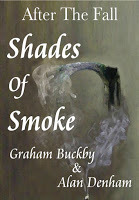 Ever fancied being a magician? In a wild and dangerous world? Your parents have been murdered, your childhood sweetheart stolen into slavery. You are embroiled with brigands, assassins, and a serial killer...But you are a magician, remember? You can conjure really good pictures in smoke...
Ever fancied being a magician? In a wild and dangerous world? Your parents have been murdered, your childhood sweetheart stolen into slavery. You are embroiled with brigands, assassins, and a serial killer...But you are a magician, remember? You can conjure really good pictures in smoke...
But nothing else!
Excerpt ‘My robe?’ the priest asked, puzzled.
‘As a deception to lure in the murderer,’ Marchan half explained.
The bemused priest nervously complied.
As soon as the door was shut, Marchan turned to Cormell.
‘Give me a few moments,’ Cormell gasped, ‘I still have to get my breath back.’
Marchan wasn’t even breathing hard. He scowled at him. ‘We need it ready when Arradon arrives,’ he urged.
Cormell nodded, and selected some thin but fresh wood. Within a short time it was smoking strongly. Marchan draped the priest’s robe over the back of the cushioned chair and shifted it around so it was facing almost directly away from the door.
Cormell added the compounds and began to work the smoke. Within a few moments he had a human figure, but he was still recovering from his run. Giving it solidity and proper appearance was going to take longer than usual!
There were noises in the street outside, as of drunks staggering past.
‘He’s here! First attempt,’ hissed Marchan. ‘He’ll have moved on because there are people around. My people. Make haste!’
Cormell concentrated. The figure solidified into a likeness of the priest, and he very carefully seated it in the chair before the fire, mostly facing away from the door, but with the head half turned as if turning to look over his shoulder. Marchan went to the window and whistled a double note, then retreated into the shadows behind the door. Cormell pressed himself back into the alcove beyond the fire hearth and held his breath. Then they waited.
There was a crushing silence. A log crackled on the fire.
Doubt began to gnaw at Cormell, as well as the need to breathe. Had Marchan’s people frightened Arradon off?
There was the sound of a footfall on the step. A knock on the door.
‘Who is it?’ Marchan called out, muffling his voice.
‘Priest, I must speak with you,’ came a voice from outside.
‘Enter,’ called Marchan. ‘My door is never locked.’
There was a click and a creak as the door began to open - then suddenly it was flung wide. Arradon leapt into the room, his face contorted into a ferocious snarl, and swung a cosh with all his strength at the head of Cormell’s illusion - and staggered off balance as it instantly dissolved into smoke. He sprawled over the chair.
Before Arradon could regain his feet Marchan had stepped forward with a blade raised where Arradon could see it, and Arradon dropped the garrotte he had been carrying in his other hand.‘Caught in the act!’ hissed Marchan triumphantly. ‘You’re mine!’
If you like what you've seen, you can buy the novel on Amazon.
And be sure to comment.
 Alan Denham, born and raised in north London (the original one, in England). Grammar school, then University of Aston in Birmingham, combined degree in geology and chemistry (just!). Nine months in industry convinced me that I didn’t like it, so I went into teaching. In those days a science degree was qualification enough to become a secondary school teacher, which I did for a year and a half before deciding to get properly trained and go into junior schools. That worked well, but sadly I eventually ran into a pair of bullying bosses – a common enough story, but it still hurts! So I went back to University, took a Masters degree in computing and switched to adult education.In parallel with all that, I married but had no kids (we kept big dogs instead), and I acquired some woodworking skills, principally carving – and occasionally wrote in what little spare time I still had (e.g. when it was too cold to go into the workshop).
Alan Denham, born and raised in north London (the original one, in England). Grammar school, then University of Aston in Birmingham, combined degree in geology and chemistry (just!). Nine months in industry convinced me that I didn’t like it, so I went into teaching. In those days a science degree was qualification enough to become a secondary school teacher, which I did for a year and a half before deciding to get properly trained and go into junior schools. That worked well, but sadly I eventually ran into a pair of bullying bosses – a common enough story, but it still hurts! So I went back to University, took a Masters degree in computing and switched to adult education.In parallel with all that, I married but had no kids (we kept big dogs instead), and I acquired some woodworking skills, principally carving – and occasionally wrote in what little spare time I still had (e.g. when it was too cold to go into the workshop).Now retired and living in north-east England, still writing, still carving, and generally keeping myself busy!Interview
1. Tell us a little about yourself?
 How much is ‘a little’? I am recently retired, having spent all but a year or so of my career in
How much is ‘a little’? I am recently retired, having spent all but a year or so of my career in education of one form or another – mostly teaching children around ages 9-13, but my full range of experience is much wider – infants to adults in a wide range of backgrounds, abilities, and educational levels. Working mostly with ‘Middle Years’ children, I tended to be more a generalist than a specialist, but my official specialism started off as ‘general science’ and later moved into computers. Now I am retired I get involved with a lot of things, but my two main hobbies are woodcarving (http://www.coquetdale.org.uk/artists.php?id=117) and writing.
2. What made you want to become a writer?A challenge from a friend. I have told this one often, but it bears telling again. So far, I have written mostly as half of a team. Many years ago my old friend Graham decided to try his hand at writing and produced a lengthy tome that wasn’t publishable material, but showed promise. He wouldn’t let me work on it for him, so I tried my hand on my own. It was harder than I thought, and the results were awful! I showed it to Graham, mostly as grudging acknowledgement that he was rather better at this game than I was – but he grabbed it with both hands, went off and hid for a month, then sent it back – doubled in length, with a few extra characters, and showing a LOT of promise!
It went on from there, mostly as a sort of private joke between friends. Over several years we found we could work together pretty well; I plan the outlines and the big scenes; he fills in some characterisation and overdoes the world-building. Then we argue, but the final outcome is usually better than either of us could have done on our own.
After doing that for nearly 25 years, we reckoned we had come up with something publishable, just about the same time that electronic self-publishing became viable – so we did.
3. Do you think people have misconceptions about the speculative fiction? Why do you think it is a worthwhile genre?I have been a reader of SF and some Fantasy since I first became aware of the genre – before I could even spell ‘genre’! These areas thrive on simple storytelling. OK, all books need to have a good story, but what do you add? Crime and adventure (and war, and westerns) add excitement and action – sometimes so much that the actual story gets so deeply buried it ceases to be important. That is generally not to my taste! More literary work adds intense studies of the human condition – and becomes very erudite, and (for me) sometimes requires considerable effort to read. Again, not to my taste! Romance? Definitely not to my taste! F/SF takes a good story and uses it as a vehicle for looking at society, changed in some way – add more technology, or some magic, or some other viewpoint outside familiar human attitudes, and see what happens. SF can warn us about mis-use of science and technology (examples too numerous to quote here!), and Fantasy can remind us that we are a social animal and need our society around us, and society needs rules. Change those rules too much, or too fast, or in the wrong way, and the society is in trouble!
For all that, I return to my original point – F/SF is basically about simple storytelling, and that has been at the core of society pretty well since the cave-men invented language.
4. What is the biggest surprise that you experienced after becoming a writer?Say ‘during’ rather than ‘after’ – it is the amount of work! The ideas come, and then they grow – but when I start to write them, I get absorbed in the details, and things wander off course and need to be dragged back into line – or the story has to be redefined to fit what the details require. Seeing the whole and seeing the details and keeping them together needs a lot more effort than I thought when I first started! Also – I used to be pretty good at English, but years of seeing the same mistakes over and over in children’s work has left me more familiar with common mistakes than with correct spellings, grammar, etc!
5. Of all the characters you have created, which is your favorite and why?Cormell, from Shades of Smoke. There are two threads here. The first is that Graham and I were looking for an agent without much success, and we thought writing some short stories and getting them into magazines might raise our profile and lead to a breakthrough. So we sat outside a pub on a beautiful warm day and over the course of two pints came up with three short story ideas. But one of them refused to stay as a short story and became “Shades of Smoke,” probably the best thing we have written yet.
The other thread is a book (or it might have been just a short story) that I read about 50 years ago. Poul Anderson, I think, though I have never seen it since and can’t be sure. In one small scene near the start a character is manipulating the smoke from his cigar, making pictures. The idea stuck! Cormell is introduced as a young lad, about 11 or 12, with an unrecognised talent. We didn’t want to do a JK Rowling, so we ran him through school/college in about three pages, and then wrote him as a young man, freshly qualified (Journeyman Illusionist), discovering his world, and seeking revenge for the murder of his parents. Fair justification, we thought, in a world with little law and no effective police force. To get that revenge he has to use his particular talent, which is a very weak and structured form of magic, in some subtle ways – and that is just the opening chapters. If you want to know more, get the sample from Amazon!
6. Tell us a little about your plans for the future. Do you have any other books in the works?This is where it all goes wrong. Graham and I have recently had some arguments about where the stories are going – so the partnership is in trouble! Maybe we can resolve it, maybe not. If not, then Graham has some historical work that he has done on his own, and I am working on some crime on my own, so we may well continue independently. I also have some Fantasy that no longer fits the world Graham and I created, so I may rewrite it to stand alone. And the crime I am working on at present is something I started a few years ago, mostly as therapy! I ran into a bullying boss at school, and that part of my career took a nasty knock, so while I was off sick I started writing my boss as the victim of some horrendous murder attempts. It helped save me from trying one for real! That was nearly 20 years ago, and the framework I wrote at the time needs a lot of updating – or some historical context to establish a timeframe, and it might be easier if I push it back a decade or so . . . lots of work, but you never know, it might come out right.
Where can we find you online? (please cut and paste links):Blog: Sorry, I don’t. I tried, here (https://www.goodreads.com/author/show/7336561.Alan_Denham/blog), managed four posts in just over a year, and gave up. (Editor aside: blogging is a lot more work than I realized.)Website: www.planetnuome.co.ukFacebook: I am on Facebook, here (https://www.facebook.com/profile.php?id=100008998840806&fref=ts) but don’t bother looking – I keep that world separate from my writing.Twitter: @Nuomer1Amazon.co.uk: https://www.amazon.co.uk/Shades-Of-Smoke-Nuome-ebook/dp/B005YBJSB2/ref=sr_1_2?s=books&ie=UTF8&qid=1319306771&sr=1-2Amazon.com: https://www.amazon.com/Shades-Of-Smoke-Nuome-ebook/dp/B005YBJSB2/ref=sr_1_39?s=books&ie=UTF8&qid=1320169753&sr=1-39Others: Smashwords – and we never did get their database sorted out, so you will have to search under Graham’s name – Buckby – or the title of the book.. https://www.smashwords.com/books/search?query=BuckbyShades of Smoke
 Ever fancied being a magician? In a wild and dangerous world? Your parents have been murdered, your childhood sweetheart stolen into slavery. You are embroiled with brigands, assassins, and a serial killer...But you are a magician, remember? You can conjure really good pictures in smoke...
Ever fancied being a magician? In a wild and dangerous world? Your parents have been murdered, your childhood sweetheart stolen into slavery. You are embroiled with brigands, assassins, and a serial killer...But you are a magician, remember? You can conjure really good pictures in smoke...But nothing else!
Excerpt ‘My robe?’ the priest asked, puzzled.
‘As a deception to lure in the murderer,’ Marchan half explained.
The bemused priest nervously complied.
As soon as the door was shut, Marchan turned to Cormell.
‘Give me a few moments,’ Cormell gasped, ‘I still have to get my breath back.’
Marchan wasn’t even breathing hard. He scowled at him. ‘We need it ready when Arradon arrives,’ he urged.
Cormell nodded, and selected some thin but fresh wood. Within a short time it was smoking strongly. Marchan draped the priest’s robe over the back of the cushioned chair and shifted it around so it was facing almost directly away from the door.
Cormell added the compounds and began to work the smoke. Within a few moments he had a human figure, but he was still recovering from his run. Giving it solidity and proper appearance was going to take longer than usual!
There were noises in the street outside, as of drunks staggering past.
‘He’s here! First attempt,’ hissed Marchan. ‘He’ll have moved on because there are people around. My people. Make haste!’
Cormell concentrated. The figure solidified into a likeness of the priest, and he very carefully seated it in the chair before the fire, mostly facing away from the door, but with the head half turned as if turning to look over his shoulder. Marchan went to the window and whistled a double note, then retreated into the shadows behind the door. Cormell pressed himself back into the alcove beyond the fire hearth and held his breath. Then they waited.
There was a crushing silence. A log crackled on the fire.
Doubt began to gnaw at Cormell, as well as the need to breathe. Had Marchan’s people frightened Arradon off?
There was the sound of a footfall on the step. A knock on the door.
‘Who is it?’ Marchan called out, muffling his voice.
‘Priest, I must speak with you,’ came a voice from outside.
‘Enter,’ called Marchan. ‘My door is never locked.’
There was a click and a creak as the door began to open - then suddenly it was flung wide. Arradon leapt into the room, his face contorted into a ferocious snarl, and swung a cosh with all his strength at the head of Cormell’s illusion - and staggered off balance as it instantly dissolved into smoke. He sprawled over the chair.
Before Arradon could regain his feet Marchan had stepped forward with a blade raised where Arradon could see it, and Arradon dropped the garrotte he had been carrying in his other hand.‘Caught in the act!’ hissed Marchan triumphantly. ‘You’re mine!’
If you like what you've seen, you can buy the novel on Amazon.
And be sure to comment.
Published on October 12, 2016 03:00
October 11, 2016
Character Tuesday, Vanyel, the last Herald-Mage
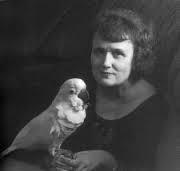 Although I'm not as fond of her more recent work, Mercedes Lackey has been one of my favorite authors for decades. I used to say that I wanted to be her when I grew up. I would still like to be her and have my Korthlundia as well known as her Valdemar. Therefore, it's no surprise that many of my favorite characters come from her novels.
Although I'm not as fond of her more recent work, Mercedes Lackey has been one of my favorite authors for decades. I used to say that I wanted to be her when I grew up. I would still like to be her and have my Korthlundia as well known as her Valdemar. Therefore, it's no surprise that many of my favorite characters come from her novels.At the con I attended this weekend, one of the other authors claimed she didn't like it when authors tortured their characters. I, on the other hand, have an affinity for the tortured soul, and Lackey knows how to torture her characters with the best of them.
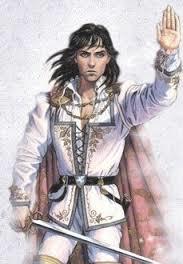 Vanyel from The Last Herald-Mage trilogy is one of those tortured souls that lingers with me despite
Vanyel from The Last Herald-Mage trilogy is one of those tortured souls that lingers with me despitethe fact that it's been almost two decades since I first read the novels. Vanyel is both gay and a powerful mage who'd rather be a bard. His father rejects him both accounts and makes his childhood a living hell. He falls in love and becomes lifebonded to Tylendel, only to have his lover torn from him when Tylendel goes mad with grief over his brother's death, unleashes a deadly force on the kingdom, and commits suicide. And all that is only in the first half of the first book in the trilogy.
Lackey has much more torture in store for him, but he also becomes powerful, kind, responsible. He is a character I will never forget. If you haven't read Lackey's work and especially The Last Herald-Mage trilogy, you should really check it out. The books are as good today as when they were written.
Published on October 11, 2016 03:00
October 10, 2016
Korthlundia, a land of fantasy
The Kronicles of Korthlundia take place in a kingdom of my creation. Below I describe where I, no I mean Sulis, reigns as goddess.
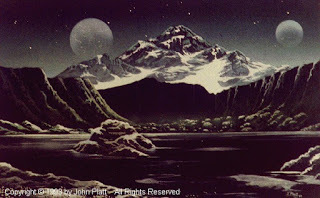 Korthlundia is often called the joined kingdoms because throughout most of its history the northern kingdom of Korth was separated from the southern kingdom of Lundia. Divided by a mountain range that is impassable for most of the winter, the two kingdoms have a long history of animosity. In attempt to end centuries of warfare between Korth and Lundia, the heirs of the two kingdoms—Queen Samantha’s grandparents, Maeve of Korth and Lir of Lundia—married. However, it took an additional fifteen years and the reign of their son Solar to end the hostilities and meld the two kingdoms into one. Thanks to Solar’s brilliant rule and long life, peace has reigned in the land for the past fifty years, but the murder of Solar and the ascension of his young heir—Samantha is only nineteen when she takes the throne—has made such peace precarious.
Korthlundia is often called the joined kingdoms because throughout most of its history the northern kingdom of Korth was separated from the southern kingdom of Lundia. Divided by a mountain range that is impassable for most of the winter, the two kingdoms have a long history of animosity. In attempt to end centuries of warfare between Korth and Lundia, the heirs of the two kingdoms—Queen Samantha’s grandparents, Maeve of Korth and Lir of Lundia—married. However, it took an additional fifteen years and the reign of their son Solar to end the hostilities and meld the two kingdoms into one. Thanks to Solar’s brilliant rule and long life, peace has reigned in the land for the past fifty years, but the murder of Solar and the ascension of his young heir—Samantha is only nineteen when she takes the throne—has made such peace precarious.
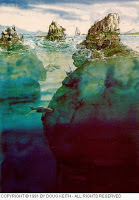 However, civil war is the only military threat to the joined kingdoms, which are isolated and mostly inaccessible to the rest of the world. Korthlundia is bordered on the north by the frozen wastelands of Fruscarettr, and on the south and west are the deserts of Sehra. Both regions are inhabited only by isolated nomads. The east of Korthlundia faces the sea, but the waters off the coast are littered with rocks and reefs, making approach by sea extremely dangerous. There is only one semi-safe harbor, that of the capital city of Murtaghan. Even this harbor can only be navigated at high tide and requires the guidance of a local vessel with knowledge of all obstacles scattered throughout the harbor. Because of it isolated nature, Korthlundia does not even have an army, just a small Royal Guard. Long years of peace have led to great prosperity for the people of the joined kingdoms.
However, civil war is the only military threat to the joined kingdoms, which are isolated and mostly inaccessible to the rest of the world. Korthlundia is bordered on the north by the frozen wastelands of Fruscarettr, and on the south and west are the deserts of Sehra. Both regions are inhabited only by isolated nomads. The east of Korthlundia faces the sea, but the waters off the coast are littered with rocks and reefs, making approach by sea extremely dangerous. There is only one semi-safe harbor, that of the capital city of Murtaghan. Even this harbor can only be navigated at high tide and requires the guidance of a local vessel with knowledge of all obstacles scattered throughout the harbor. Because of it isolated nature, Korthlundia does not even have an army, just a small Royal Guard. Long years of peace have led to great prosperity for the people of the joined kingdoms.
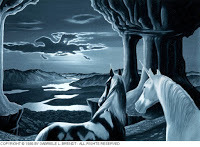 Korthlundia is a beautiful country. Just inland from the capital city of Murtaghan, which is in Lundia, lies the Setanta forest. There the trees tower over the forest floor and are as wide around as a house. The forest gives way to the Reidhlean Plains, a flat land of endless grasses that are inhabited by the Horsetads, a race of horses that possess magical properties and cannot be tamed. Korth is more mountainous with sheer cliffs, steep drop offs, and magnificent waterfalls.
Korthlundia is a beautiful country. Just inland from the capital city of Murtaghan, which is in Lundia, lies the Setanta forest. There the trees tower over the forest floor and are as wide around as a house. The forest gives way to the Reidhlean Plains, a flat land of endless grasses that are inhabited by the Horsetads, a race of horses that possess magical properties and cannot be tamed. Korth is more mountainous with sheer cliffs, steep drop offs, and magnificent waterfalls.
In The Soul Stone this peaceful, beautiful land is threatened by the Bard Alvabane. In order to reclaim Lundia for her people who were driven out a thousand years ago by the hero Armunn, Alvabane claims the power of the Soul Stone, an ancient weapon that drains the life out of the land—killing people, animals, and even plants. Alvabane’s use of the Stone creates the Dead Lands, in which nothing, not even the cockroaches, can survive.
To learn more about my world, read either The Goddess's Choice or The Soul Stone.
 Korthlundia is often called the joined kingdoms because throughout most of its history the northern kingdom of Korth was separated from the southern kingdom of Lundia. Divided by a mountain range that is impassable for most of the winter, the two kingdoms have a long history of animosity. In attempt to end centuries of warfare between Korth and Lundia, the heirs of the two kingdoms—Queen Samantha’s grandparents, Maeve of Korth and Lir of Lundia—married. However, it took an additional fifteen years and the reign of their son Solar to end the hostilities and meld the two kingdoms into one. Thanks to Solar’s brilliant rule and long life, peace has reigned in the land for the past fifty years, but the murder of Solar and the ascension of his young heir—Samantha is only nineteen when she takes the throne—has made such peace precarious.
Korthlundia is often called the joined kingdoms because throughout most of its history the northern kingdom of Korth was separated from the southern kingdom of Lundia. Divided by a mountain range that is impassable for most of the winter, the two kingdoms have a long history of animosity. In attempt to end centuries of warfare between Korth and Lundia, the heirs of the two kingdoms—Queen Samantha’s grandparents, Maeve of Korth and Lir of Lundia—married. However, it took an additional fifteen years and the reign of their son Solar to end the hostilities and meld the two kingdoms into one. Thanks to Solar’s brilliant rule and long life, peace has reigned in the land for the past fifty years, but the murder of Solar and the ascension of his young heir—Samantha is only nineteen when she takes the throne—has made such peace precarious.  However, civil war is the only military threat to the joined kingdoms, which are isolated and mostly inaccessible to the rest of the world. Korthlundia is bordered on the north by the frozen wastelands of Fruscarettr, and on the south and west are the deserts of Sehra. Both regions are inhabited only by isolated nomads. The east of Korthlundia faces the sea, but the waters off the coast are littered with rocks and reefs, making approach by sea extremely dangerous. There is only one semi-safe harbor, that of the capital city of Murtaghan. Even this harbor can only be navigated at high tide and requires the guidance of a local vessel with knowledge of all obstacles scattered throughout the harbor. Because of it isolated nature, Korthlundia does not even have an army, just a small Royal Guard. Long years of peace have led to great prosperity for the people of the joined kingdoms.
However, civil war is the only military threat to the joined kingdoms, which are isolated and mostly inaccessible to the rest of the world. Korthlundia is bordered on the north by the frozen wastelands of Fruscarettr, and on the south and west are the deserts of Sehra. Both regions are inhabited only by isolated nomads. The east of Korthlundia faces the sea, but the waters off the coast are littered with rocks and reefs, making approach by sea extremely dangerous. There is only one semi-safe harbor, that of the capital city of Murtaghan. Even this harbor can only be navigated at high tide and requires the guidance of a local vessel with knowledge of all obstacles scattered throughout the harbor. Because of it isolated nature, Korthlundia does not even have an army, just a small Royal Guard. Long years of peace have led to great prosperity for the people of the joined kingdoms. Korthlundia is a beautiful country. Just inland from the capital city of Murtaghan, which is in Lundia, lies the Setanta forest. There the trees tower over the forest floor and are as wide around as a house. The forest gives way to the Reidhlean Plains, a flat land of endless grasses that are inhabited by the Horsetads, a race of horses that possess magical properties and cannot be tamed. Korth is more mountainous with sheer cliffs, steep drop offs, and magnificent waterfalls.
Korthlundia is a beautiful country. Just inland from the capital city of Murtaghan, which is in Lundia, lies the Setanta forest. There the trees tower over the forest floor and are as wide around as a house. The forest gives way to the Reidhlean Plains, a flat land of endless grasses that are inhabited by the Horsetads, a race of horses that possess magical properties and cannot be tamed. Korth is more mountainous with sheer cliffs, steep drop offs, and magnificent waterfalls.In The Soul Stone this peaceful, beautiful land is threatened by the Bard Alvabane. In order to reclaim Lundia for her people who were driven out a thousand years ago by the hero Armunn, Alvabane claims the power of the Soul Stone, an ancient weapon that drains the life out of the land—killing people, animals, and even plants. Alvabane’s use of the Stone creates the Dead Lands, in which nothing, not even the cockroaches, can survive.
To learn more about my world, read either The Goddess's Choice or The Soul Stone.
Published on October 10, 2016 03:00
October 8, 2016
The Goddess's Choice audio: Chapter 2
This week listen to the second chapter of my first novel. I'd love to hear any comments about it.
The Goddess's Choice is available on Amazon and other online retailers.
The Goddess's Choice is available on Amazon and other online retailers.
Published on October 08, 2016 03:00

